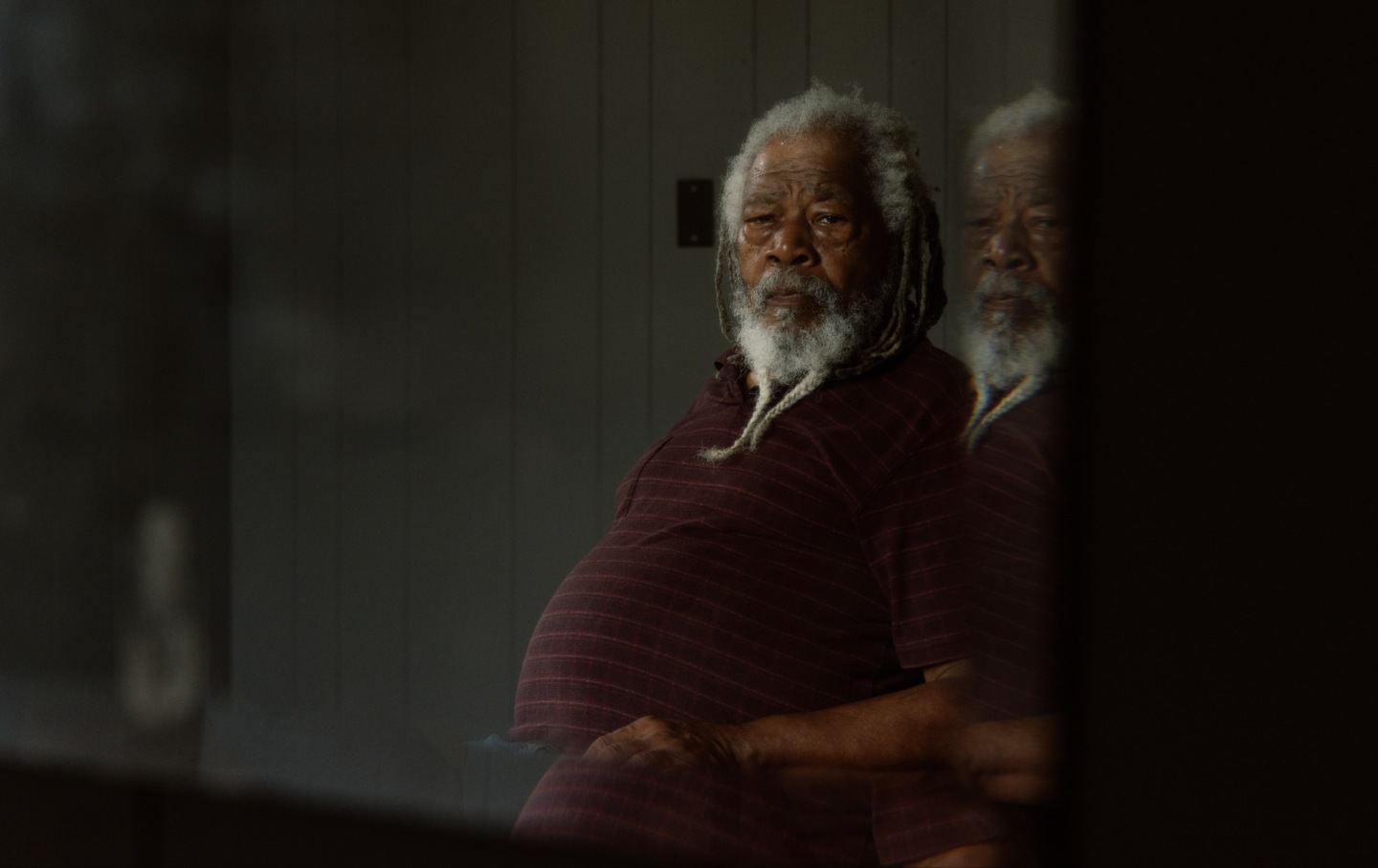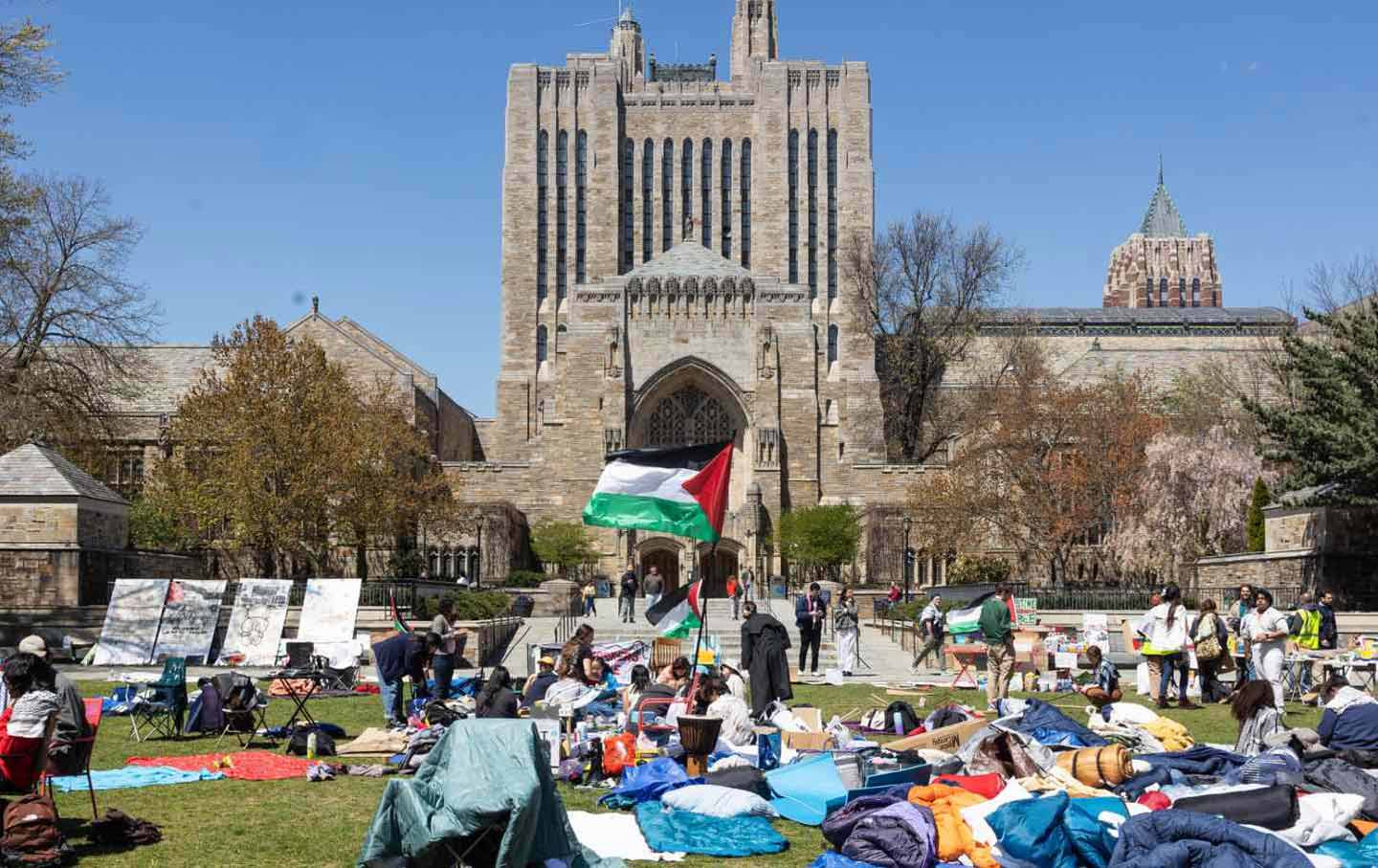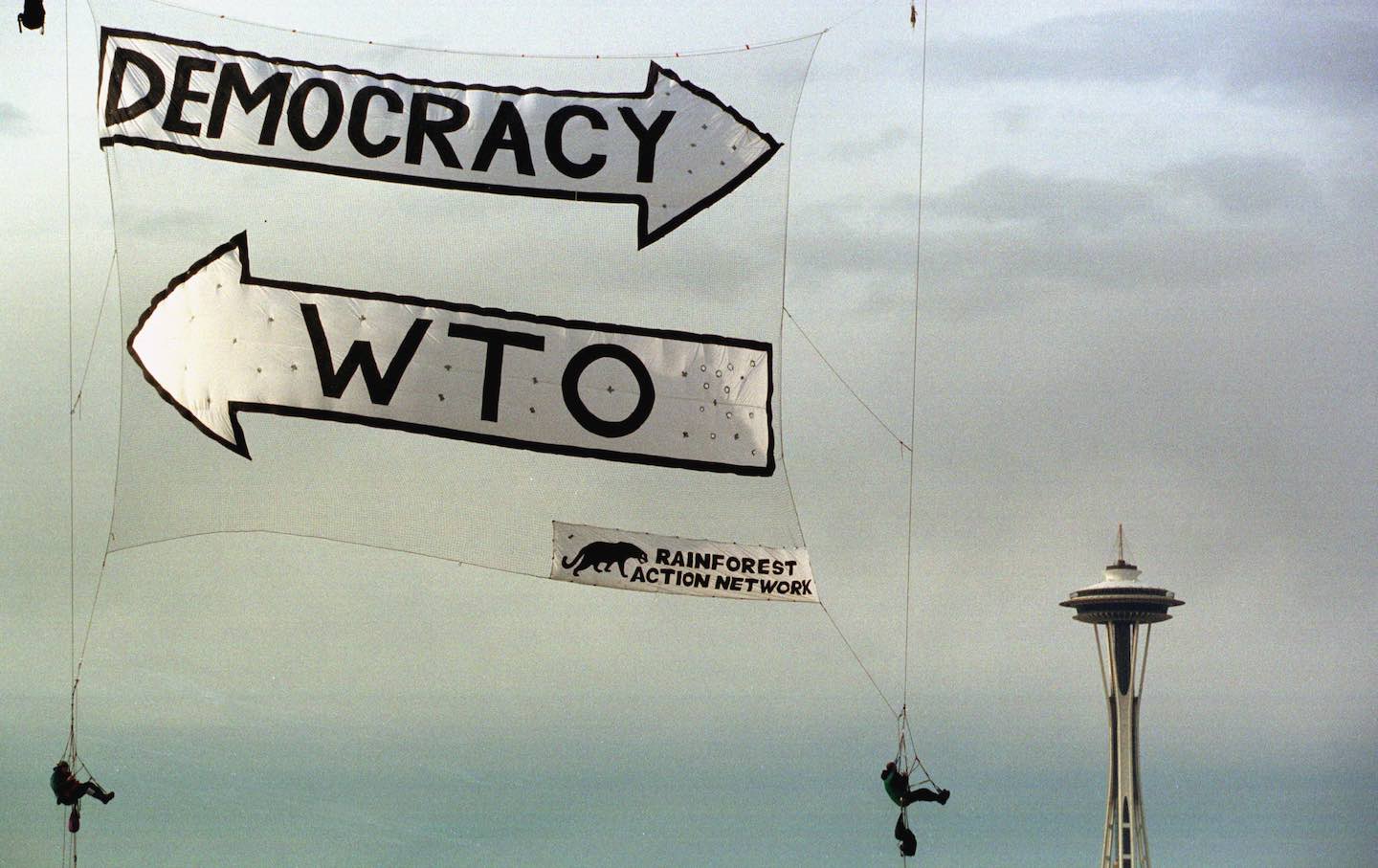Over the last twelve months, we’ve seen an extraordinary surge in student organizing around abortion rights, labor rights, climate change, and more in the lead up to the election. Of course, the broadest and most sustained student activism concerned the war on Gaza, with young people organizing to pressure their universities to divest from companies affiliated with Israel. In 2024, StudentNation published around 100 original articles by student journalists reporting on youth-oriented movements and issues across the country. We’ve selected 20 of the year’s best articles to highlight the extraordinary writing and reporting of the next generation. We’re deeply grateful to the Puffin Foundation whose great generosity to The Nation Fund for Independent Journalism made this work possible.
“UChicago’s Arrest of Pro-Palestine Activists Shows Its Flimsy Commitment to ‘Free Speech,’” by Kelly X. Hui (January 16)
After over two dozen students and faculty were arrested during a peaceful sit-in by UChicago United for Palestine, StudentNation writer (and later, Nation intern) Kelly X. Hui challenged the university’s reputation for being a leader on campus free speech. “Of course, UChicago’s tough response is not isolated, but part of a larger national campus crackdown,” wrote Hui, months before students would form Gaza Solidarity Encampments across the country.
“In Ithaca, Climate Change Is Making Gentrification Worse” by Meher Bhatia (January 24)
FEMA’s revised flood maps for Ithaca, New York—updated for the first time in over 40 years— significantly broadened risk zones enveloping the Southside neighborhood, a bastion of rich culture and Black heritage. But increases in housing and living costs, including flood insurance, threatened to push out longtime lower-income residents and undermine this sense of community, writes Meher Bhatia.
In early February, 19 students at Brown University began the largest hunger strike for Palestine in the United States since Israel’s war on Gaza began, refusing food until the university administration agreed to bring a resolution to divest its endowment from companies that provide weapons and equipment to the Israeli government. In April, the university agreed to a vote, but the Brown Corporation rejected the proposal in October.
“The #NeverAgain Movement Six Years Later,” by Zachariah Sippy and Marie-Rose Sheinerman (February 14)
A 2018 school shooting in Parkland, Florida galvanized hundreds of thousands of young people to push for stronger gun control measures. Six years later, Zachariah Sippy and Marie-Rose Sheinerman followed up with some of the student activists and co-founders of March for Our Lives to see how their thinking, strategy, and priorities have shifted.
“The Mama Bears of Montgomery County, Texas,” by Yasmeen Khan (March 22)
In 2022, three conservative Christian women with no prior political experience, calling themselves the “Mama Bears,” were elected to a school board in the ninth largest district in Texas. In the 2022-2023 school year, the district banned 59 books, more than any other in the greater Houston area. The year prior, they banned none.
“After Texas’s DEI Ban, College Students Are Reconsidering State Schools,” by Aina Marzia (March 26)
In June, Texas Governor Greg Abbott signed a law banning diversity, equity, and inclusion programs in the state university system—including multicultural centers and campus identity groups. Two months after the law went into effect, StudentNation writing fellow Aina Marzia talked with current college students as well as high school students reconsidering their applications to in-state universities.
“Inside Connecticut’s Fight to Expand Medicaid Coverage for Undocumented Immigrants,” by Kayla Yup (April 4)
Connecticut expanded Medicaid coverage to undocumented immigrants up to age 12 in January 2023—the first time undocumented immigrants of any age could qualify for coverage from the state. More than 9,000 children benefitted from this expansion, and in 2023, the state passed a bill covering undocumented immigrants up to age 15. But it still falls short of advocates’ goals. “Healthcare should be a human right regardless of age, and especially immigration status,” said Najely Clavijo, an organizer for CT Students for a Dream.
“Students at the University of Florida Passed a Historic Pledge for a Green New Deal,” by Cameron Driggers and Meagan Lamey (April 9)
This year, the University of Florida became the first public university whose student government gave a direct mandate for a Green New Deal, calling for sweeping on-campus decarbonization, complete divestment from the fossil fuel industry, and restorative justice for marginalized communities most affected by the climate crisis. “Whether in conventionally blue states or red states, the march toward climate justice will continue,” wrote UF students Cameron Driggers and Meagan Lamey.
Popular
“swipe left below to view more authors”Swipe →
“Saving Paradise: The Fight to End Militarization in Hawai‘i,” by Saliha Bayrak (April 17)
“Hawai‘i is the most densely militarized state in the nation. About 17 percent of the population is military-affiliated, and some 6 percent of the land is occupied by military bases,” wrote Saliha Bayrak. But activists with Hawai‘i Peace and Justice are working to have this land returned to the people of Hawai‘i. “The land is our actual ancestor. It is who we come from,” said Tia Marie Masaniai, a youth organizer with HPJ.
“Inside the Gaza Solidarity Encampment at Columbia University,” by Lara-Nour Walton (April 19)
While outside press access to Columbia University’s campus was restricted, student journalists continued to cover the formation of the Gaza Solidarity Encampment, including StudentNation writer Lara-Nour Walton. The NYPD’s crackdown saw the largest mass arrests of student protesters since the war on Gaza began, but activists were not deterred. Less than two weeks later, Lara-Nour also documented the subsequent occupation of Hamilton Hall—the same building that anti-Vietnam War and anti-gentrification protesters occupied in 1968.
“The Crackdown on Campus Protests Is Happening Everywhere,” by StudentNation (April 26)
Following the dismantling of the Columbia encampment by the NYPD, students at dozens of other colleges—including the University of Minnesota, the University of Pittsburgh, Berkeley, and Yale—quickly established similar encampments. With calls for divestment growing louder, we asked more than a dozen students nationwide to share how their schools responded to protests. “I was one of three students suspended for the crime of speaking out against our university’s continued complicity in genocide, and now I’m banned from campus under the threat of arrest,” wrote Daniel Cázares at Washington University in St. Louis.
“How Yale University Surveils Pro-Palestine Students,” by Theia Chatelle (May 20)
Former StudentNation writing fellow Theia Chatelle used Connecticut’s Freedom of Information Act to obtain documents for The Nation showing a pattern of targeted monitoring of student protesters—from administrator presence at rallies to police surveillance of students’ social media accounts, to coordination between campus, local, and state police forces.
“Surfers Are Fighting to Save the Waves—and the Planet,” by Ilana Cohen (May 28)
By the end of the century, the world could lose almost half of its sandy beaches. But a movement of surfers across Latin America is working to protect the coastal-marine environment, writes Ilana Cohen. “Although a variety of indirect legal mechanisms for conserving waves have been identified globally, Peru is one of the only countries with a law dedicated to protecting surf breaks.”
“As the NCAA Debates New Rules, Trans Athletes Are Left Out of the Conversation,” by Liam Beran (June 20)
“At least 24 states have restricted transgender athletes’ participation in sports; 18 of those states specifically restrict college athletics,” wrote Liam Beran. Yet these policymaking decisions lack input from those most affected. “Often when we talk about trans people in sports, it’s kind of this abstract, like, almost mythologized, like, scary trans person,” Emmett Lockwood, a trans student athlete in Wisconsin, told Beran. “And I think a lot of times like, folks don’t realize that this is going to be impacting someone’s real life on the day to day.”
“Donald Trump’s Secret Weapon to Dismantle American Education,” by Owen Dahlkamp (July 5)
In a deep dive into Donald Trump’s “Agenda47,” Owen Dahlkamp shows how the former president’s plans for a second term could reshape American education and academic freedom as we know it. “Trump plans to shutter the Department of Education, restore prayer in schools, create an American Academy that awards low-cost degrees to students paid for by levying financial penalties against institutions that do not yield to his ideological standards, revitalize school choice, limit discussion of LGBTQ+ content in classrooms, and much more.”
“Despite Bargaining Slowdowns, RA Unions Are Still Booming,” by Lucy Tobier (July 10)
“Residential Assistant unionization campaigns have achieved historic success over the past two years, including job protections, sanctuary campuses, and new stipends,” wrote Lucy Tobier. In 2016, a ruling from the National Labor Relations Board recognized graduate and undergraduate students at private universities as employees, and organizers fear a reshaped NLRB under a second Trump term could undermine their strategy. “Our plan for that is not to be afraid or not to worry,” said Scott Williams, an organizer with OPEIU Local 153. “It’s to keep organizing as rapidly and as strongly as possible.”
“Will the Closure of an Oil Refinery Bring Justice or Gentrification to Philadelphia?,” by Amber X. Chen
(September 16)
Four years after the largest oil refinery on the East Coast shut down, residents in South and Southwest Philadelphia are still worried about what will come next. “Decades of pollution have not only harmed the health of residents but also contaminated soil and bodies of water. How can people guarantee that their communities will be cleaned up? What will happen to all the jobs the oil refinery provided? And how can people ensure that the prosperity promised by a new development will not push residents out of the neighborhoods they have lived in for decades?”
“The Hidden Barriers to Voting While Unhoused,” by Maggie Grether (October 23)
Voter turnout is low among people experiencing homelessness. The most recent study on the topic, on the 2012 elections, estimated that only 10 percent of eligible voters experiencing homelessness actually voted—a fraction of the overall turnout of the country’s voting-age population. “Some may make a personal political choice not to vote. Others face barriers to registering and receiving election information without a permanent address,” wrote Maggie Grether. But even more pressing, experts say, is the widespread misconception that people cannot vote.”
“Conservatives Are Trying to Trick Nebraskans Into Voting for an Abortion Ban,” by Annika Inampudi (November 1)
Nebraskan voters found two competing abortion measures on their ballots this year—one pro-choice and one anti-choice. Leading up to November, anti-choice groups resorted to increasingly desperate tactics to confuse voters about which was which. “A recent advertisement put out by Protect Women and Children Nebraska mimics the imagery and language of the pro-choice movement.” On election day, the state voted to prohibit abortions after the first trimester. “If [these tactics are] successful here, they’re going to try this across the states,” said Allie Berry of Protect Our Rights, the group behind the pro-choice initiative.
“The ‘Existential Threat’ Facing Ohio’s Public School System,” by Zurie Pope (December 2)
Ohio now spends more than $970 million on private school voucher scholarships. In January 2022, a lawsuit challenging the state’s EdChoice voucher program was filed by a coalition of over 130 school districts across the state and is finally scheduled to go to trial next year. “Not only does this voucher program unconstitutionally usurp Ohio’s public tax dollars to subsidize private school tuitions, it does so by depleting Ohio’s foundation funding – the pool of money out of which the state funds Ohio’s public schools – otherwise available to already struggling school districts for the education of their students,” reads the lawsuit.
With a hostile incoming administration, a massive infrastructure of courts and judges waiting to turn “freedom of speech” into a nostalgic memory, and legacy newsrooms rapidly abandoning their responsibility to produce accurate, fact-based reporting, independent media has its work cut out for itself.
At The Nation, we’re steeling ourselves for an uphill battle as we fight to uphold truth, transparency, and intellectual freedom—and we can’t do it alone.
This month, every gift The Nation receives through December 31 will be doubled, up to $75,000. If we hit the full match, we start 2025 with $150,000 in the bank to fund political commentary and analysis, deep-diving reporting, incisive media criticism, and the team that makes it all possible.
As other news organizations muffle their dissent or soften their approach, The Nation remains dedicated to speaking truth to power, engaging in patriotic dissent, and empowering our readers to fight for justice and equality. As an independent publication, we’re not beholden to stakeholders, corporate investors, or government influence. Our allegiance is to facts and transparency, to honoring our abolitionist roots, to the principles of justice and equality—and to you, our readers.
In the weeks and months ahead, the work of free and independent journalists will matter more than ever before. People will need access to accurate reporting, critical analysis, and deepened understanding of the issues they care about, from climate change and immigration to reproductive justice and political authoritarianism.
By standing with The Nation now, you’re investing not just in independent journalism grounded in truth, but also in the possibilities that truth will create.
The possibility of a galvanized public. Of a more just society. Of meaningful change, and a more radical, liberated tomorrow.
In solidarity and in action,
The Editors, The Nation
More from The Nation

Former Black Panthers fear the FBI is still keeping tabs on them decades after COINTELPRO. In at least one case, they were right.

The referendum calls on the school to divest its $41 billion endowment from military weapons manufacturing firms, yet the power to do so is in the hands of the board of trustees.

December 10 is Human Rights Day, commemorating the anniversary of the Universal Declaration of Human Rights (UDHR), one of the world’s most groundbreaking global pledges.

